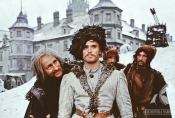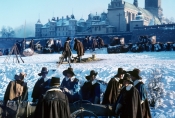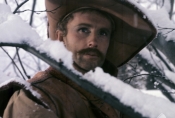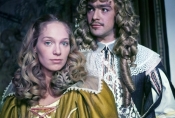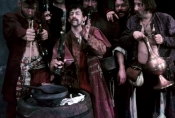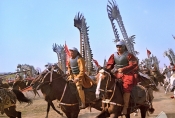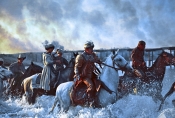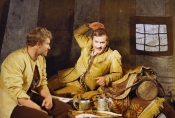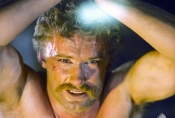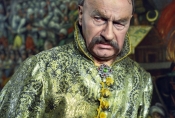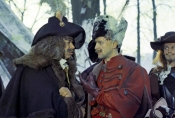THE DELUGE [1974]
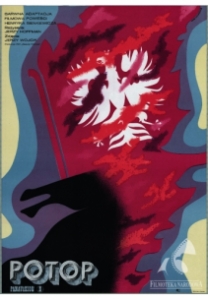
year:
- 1974
release date:
- 2 IX 1974
runtime:
- 316 min
directed by:
- Jerzy Hoffman
written by:
- Jerzy Hoffman, Adam Kersten, Wojciech Żukrowski based on the novel by Henryk Sienkiewicz
director of photography:
- Jerzy Wójcik
cast:
- Daniel Olbrychski [Andrzej Kmicic], Małgorzata Braunek [Oleńka Billewiczówna], Tadeusz Łomnicki [Jerzy Michał Wołodyjowski], Kazimierz Wichniarz [Jan Onufry Zagłoba], Władysław Hańcza [Janusz Radziwiłł], Leszek Teleszyński [Bogusław Radziwiłł], Ryszard Filipski [Soroka], Wiesława Mazurkiewicz [aunt Kulwiecówna], Franciszek Pieczka [old Kiemlicz], Lesław Janicki [Damian Kiemlicz], Wacław Janicki [Kosma Kiemlicz], Bruno O'Ya [Józwa Butrym], Włodzimierz Bednarski [Zend], Bogusz Bilewski [Kulwiec - Hippocentaurus], Andrzej Kozak [Rekuć Leliwa]
edited by:
- Zenon Piórecki
music by:
- Kazimierz Serocki
production design:
- Wojciech Krysztofiak
produced by:
- PRF Zespoły Filmowe
executive producer:
- Wilhelm Hollender
awards:
-
• Polish Feature Film Festival Gdansk 1974: Grand Prix Golden Lions for Jerzy Hoffman, best performance in a leading role for Daniel Olbrychski, Audience Award
• Golden Camera 1974
• Working People’s Film Festival (Czechoslovakia) 1975: best performance award for Daniel Olbrychski
• Award of the Minister of Culture and Arts of the 1st degree for Jerzy Hoffman
• Nomination for an Academy Award Oscar 1975
About the film
The story of the love between Andrzej Kmicic, a Polish nobleman, and Olenka Billewiczówna, against the historical background of the Swedish invasion of 1655-1660.
Kmicic initially sides with the Radziwiłł family who are collaborating with the Swedes. Realising his mistake, he kidnaps Bogusław Radziwiłł, ending a shameful chapter in his eventful life. Under the assumed name of Babinicz, he serves his homeland with dedication, gaining fame for his heroic actions during the defense of the monastery of Jasna Góra. After blowing up a Swedish cannon, he is injured and returns to his real name. His patriotic deeds are rewarded with Oleńka’s hand and the office of district governor. The most spectacular part of Sienkiewicz's trilogy, adapted in the spirit of the traditional interpretation to uplift hearts, with emphasis on the evolution of the hero, who is transformed from an irresponsible soldier into a national hero.
Jan Słodowski, Leksykon polskich filmów fabularnych, Warszawa 1996
